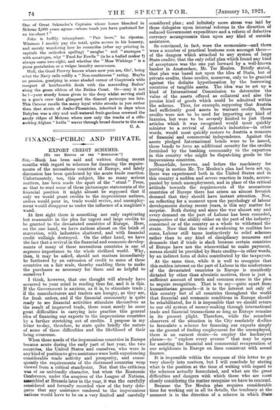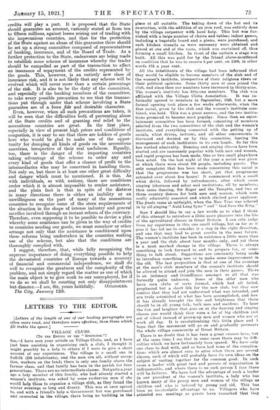(To THE EDITOR or rag " EPECTLTOR."1 Six,—Muoh has been
said and written during recent months with regard to schemes for financing the require- ments of the necessitous countries of Europe, and lately discussion has been quickened by the acute trade reaction. Unfortunately, too, this subject, like so many serious matters, has been made the sport of the " stunt " Press, so that to read some of these picturesque statements of the financial position it might almost be supposed that if only we would grant credits to the impecunious nations, orders would pour in, trade would revive, and unemploy- ment would disappear as under the influence of a magician's wand.
At first sight there is something not only captivating but reasonable in the plea for urgent and large credits to be granted to the devastated countries of Europe. Here, on the one hand, we have nations almost on the brink of starvation, with industries shattered, and with financial credit wellnigh destroyed. On the other hand, we have the fact that a revival in the financial and economic develop- ments of many of these necessitous countries is one of supreme importance to the whole civilized world. Why, then, it may be asked, should not matters immediately be furthered by an extension of credit to some of these countries on a fair scale, thereby enabling them to make the purchases so necessary for them and so helpful to ourselves I think, however, that one thought will already have occurred to your mind in reading thus far, and it is this. If the Government is anxious, as it is, to stimulate trade ; if the manufacturers and traders are hungry, as they are, for fresh orders, and if the financial community is quite ready to see financial activities stimulate themselves as the result of improved trade, there must surely be some great difficulties in carrying into practice this general idea of financing our exports to the impecunious countries by a further stretching out of credits. I propose in my letter to-day, therefore, to state quite briefly the nature of some of these difficulties and the likelihood of their being overcome.
When these needs of the impecunious countries in Europe became acute during the early part of last year, the two countries, the United States and ourselves, who were in any kind of position to give assistance were both experiencing considerable trade activity and prosperity, and conse- quently the requirements of the distressed countries wer,e viewed from a critical standpoint. Not that the criticism was of an unfriendly character, but when the Economic Conference, under the auspices of the League of Nations, assembled at Brussels later in the year, it was the carefully considered and formally recorded view of the forty dele- gates that any assistance rendered to the impecunious nations would have to be on a very limited and carefully considered. plan ; and infinitely more stress was laid by these delegates upon internal reforms in the direction of reduced Government expenditure and a reform of defective currency arrangements than upon any kind of outside assistance.
So convinced, in fact, were the economists—and there were a number of practical business men amongst them— of the dangers which attached to any system of large State credits, that the only relief plan which found any kind of acceptance was the one put forward by a well-known banker in Amsterdam, Mr. Ter Meulen. Briefly stated, that plan was based not upon the idea of State, but of private credits, those credits, moreover, only to be granted against the definite hypothecation by the borrowing countries of tangible assets. The idea was to set up a kind of International Commission to determine the value of the assets offered as collateral and also the precise kind of goods which could be admitted within the scheme. Thus, for example, supposing that Austria had sufficiently good assets to warrant credits, those credits were not to be used for importing any kind of luxuries, but were to be severely limited to just those articles which it was recognized would most quickly minister to a revival of Austria's industries in other words, would most quickly restore to Austria a measure of financial and commercial independence. Against the assets pledged International bonds were to be issued, these bonds to form an additional security for the credits furnished by the banking community to the exporters in this country who might be dispatching goods to the impecunious countries.
Meanwhile, however, and before the machinery for putting in motion Mr. Ter Meulen's plan had been set up, there was experienced both in the United States and in this country a sudden and severe reaction in trade, accom- panied by much unemployment, and in place of the critical attitude towards the requirements of the necessitous countries of Europe there has arisen an almost feverish demand that they should have instant attention. Nor, on reflecting for a moment upon the psychology of labour developments during recent years, is this any matter for surprise. Both during and since the war almost any and every demand on the part of Labour has been conceded, irrespective of the ability either on the part of the industry concerned or of the country as a whole to withstand the strain. Now that the time of awakening to realities has come, Labour still turns instinctively to relief schemes rather than to any kind of disciplinary measures and demands that if trade is slack because certain countries of Europe have not the wherewithal to make payment, means should be provided by State credits—in other words, by an indirect form of doles contributed by the taxpayers.
At the same time, while it is well to recognize that this sudden interest on the part of Labour in the misfortunes of the devastated countries in Europe is manifestly dictated by other than altruistic motives, there is just a sufficient amount of truth and common sense in theplea to require recognition. That is to say—quite apart from humanitarian grounds—it is to the interest not only of this country but of all countries throughout the world that financial and economic conditions in Europe should be rehabilitated, for it is impossible that we should return to our old system of money-making through international trade and financial transactions so long as Europe remains in its present plight. Therefore, while the soundest observers of the situation in the City resolutely dscline to formulate a scheme for financing our exports simply on the ground of finding employment for the unemployed, there is an earnest desire—to employ the hackneyed phrase—to " explore every avenue " that may be open for assisting the financial and commercial recuperation of our neighbours in Europe on lines consistent with sound finance.
It is impossible within the compass of this letter to go very closely into matters, but I will conclude by stating what 'is the position at the time of writing with regard to the schemes actually formulated, and what are the great difficulties and dangers with which those who are most closely considering the matter recognize we have to contend.
Because the Ter Meulen plan requires considerable time for working out in all its details, the tendency at the moment is in the direction of a -scheme in which State credits will play a part. It is proposed that the State should guarantee an amount, variously stated at from ten to fifteen millions, against losses arising out of trading with the impecunious countries, and that for the protection of the State against an abuse of this guarantee there should be set up a strong committee composed of representatives of banking, insurance, and of the Board of Trade. As a further protection to the State, endeavours are being made to establish some scheme of insurance whereby the trader should be compelled as part of the transaction to effect an insurance of repayment of the credits represented by the goods. This, however, is an entirely new class of insurance risk, and it is not likely that any scheme will be evolved which will cover more than a certain percentage of the risk. It is also to be the duty of the committee, and especially of the banking members of the committee, to take every possible precaution to see that the transac- tions put through under that scheme involving a State guarantee are of a bona fide and desirable character.
Even, however, when all such precautions are taken, it will be seen that the difficulties both of preventing abuse of the State credits and of granting real relief to the ce nessitous countries are great. the first place, especially in view of present high prices and conditions of congestion, it is easy to see that there are holders of goods here who would be glad to make use of the oppor- tunity for dumping all kinds of goods on the necessitous countries, irrespective of their real usefulness. Equally, too, there is the danger of the importing countries taking advantage of the scheme to order any and every kind of goods that offer a chance of profit to the intermediaries who may be concerned in handling them. Not only so, but there is at least one other great difficulty and danger which must be mentioned. It is this. As with individuals, so with nations, there are conditions under which it is almost impossible to render assistance, and the plain fact is that in spite of the distress in many directions there is either an inability or an unwillingness on the part of many of the necessitous countries to recognize some of the stern requirements of the situation in the shape of intense industry and general sacrifice involved through an instant reform of the currency. Therefore, even supposing it to be possible to devise a plan whereby some assistance can be given in the way of credits to countries needing our goods, we must somehow or other arrange not only that the assistance is conditioned upon these reforms being undertaken in the countries making use of the scheme, but also that the conditions are thoroughly complied with.
I suggest, therefore, that, while fully recognizing the supreme importance of doing everything possible to help the devastated countries of Europe towards a recovery of financial and commercial independence, we shall do well to recognize the greatness and the complexity of the problem, and not simply regard the matter as one of which the main object is to give work to our unemployed, for if we do so we shall be courting not only disappointment but disaster.—I am, Sir, yours faithfully. ONLOOKER. The City, January 12th.































 Previous page
Previous page